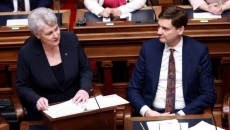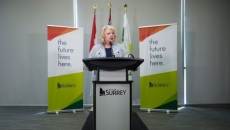Prime Minister Justin Trudeau has resisted calls for his resignation for more than a year now but in recent weeks those calls have grown louder and in some cases more public.
The Liberal caucus met Wednesday, where MPs had a three-hour long discussion about their party's current state and whether Trudeau is the best one to keep leading it.
Here's a brief recap of the issues and options on the table for the Liberals:
Why do some MPs want Trudeau to step down?
Polls have shown that Trudeau's popularity has waned among Canadians for more than a year and some MPs believe he won't be able to lead the Liberal party to victory again in the next election.
Where Trudeau's popularity once helped lift his party up, the dissatisfaction Canadians now have about his leadership is dragging the party down.
It’s an increasingly urgent concern for Liberals as a fall election became a much more likely possibility. In September the NDP ended their supply and confidence agreement with the Liberals and will now decide on support for the government on a case-by-case basis. The Bloc Québécois has also issued the Liberals an end-of-October ultimatum to support a pension bill before the Bloc pulls its support.
While some MPs have previously said Trudeau should go, a movement to oust him began to gain steam in the first two weeks of October while Trudeau was overseas at international summits in France and Laos. He cancelled plans to attend the Commonwealth summit in Samoa this week as domestic issues bubble at home.
Liberal MP Sean Casey was the first to publicly confirm that he signed a letter calling for Trudeau's resignation but hasn't said how many other MPs have joined him.
On Monday, Casey said Canadians are no longer listening to Trudeau and that he has become a distraction.
"There's been baggage accumulated. People have tuned him out," Casey told reporters.
Newfoundland and Labrador Liberal MP Ken McDonald said Wednesday he signed it and that while he isn't running again, some who are running again are nervous because of "what the polls are saying."
Most cabinet ministers have spoken out in Trudeau's defence though several indicated that it was healthy to have the conversation.
It's highly unlikely that Trudeau would step down as a result of Wednesday's meeting, said Scott Reid, who worked as the director of communications for former prime minister Paul Martin.
However, he said the situation will nonetheless hang over him as the next election looms.
“Even someone with the record of success and the tremendous reserves of confidence that Justin Trudeau enjoys, I think that's going to weigh on you,” Reid said.
“You're still left with the heavy weight of dissent toward your leadership, and you’ve got to carry that around.”
What are Trudeau's options?
If he decides to capitulate to the MPs' demands, Trudeau could announce he will step down immediately, or he could announce he won't run for re-election.
So far he has been steadfast in his assertion that he is going nowhere. He emerged from the three-hour meeting Wednesday and said the party is "strong and united" with a big smile, before striding up the stairs back to his office.
If he changes his mind, he could stay on until a new leader is chosen, or resign immediately. If he does the latter, an interim leader would fill in to head the party while a leadership race takes place.
If he resigns while his party is still in power, it could leave the Liberals vulnerable to an early election. Without a permanent Liberal leader, the NDP might see a better chance for their own fortunes and vote against the government in the next confidence motion.
Trudeau could prevent that by proroguing Parliament — which would essentially terminate the current session and hit the reset button, which could allow time for a Liberal leadership race if he did step down.
Deputy Prime Minister Chrystia Freeland said Tuesday the government has no intention of proroguing.
Can MPs force him to step down, or at least force a leadership review?
There is no mechanism that would allow the Liberal caucus to force Trudeau’s resignation because the Liberal caucus did not opt to endorse a bill that would give Liberal MPs the ability to force a leadership review from within the caucus.
The Conservatives were the only party to opt in to the Reform Act after the last election, and it was that which led to the secret ballot vote that ousted their former leader, Erin O'Toole, in early 2022.
Neither is there one to force a leadership review from the party as a whole — in fact, the party’s constitution doesn’t have a mechanism for such a review, unless the party has been defeated in a general election.
What would a Liberal leadership race look like?
If Trudeau does resign, the national president of the party must call a board meeting within 27 days to discuss the leadership race. The board must create two committees, one to manage the expenses for the leadership contest and one to plan, organize and carry out the vote.
Potential nominees must deliver their nomination at least 90 days before the vote.
If a leadership race happens it will likely be on the short side, said Reid.
“Typically, when you're in government, particularly if you're in a precarious minority Parliament, you would think that the race would likely be shorter because you don't want to go long without a prime minister who's also the leader of his party,” he said.
However, he said it’s quite uncommon for a ruling party with a minority to hold a leadership race.
Who would run to replace Trudeau?
There is a growing number of cabinet ministers on a list of possible successors, some just through the rumour mill, while some have begun quietly organizing for a future run whenever it may be.
Those lists of potential candidates include Freeland, Industry Minister François-Philippe Champagne, Foreign Affairs Minister Mélanie Joly, Housing Minister Sean Fraser, Public Safety Minister Dominic LeBlanc and Treasury Board President Anita Anand.
Former Bank of Canada governor Mark Carney and former B.C. Premier Christy Clark have both hinted at a possible run as well.
Carney was tapped in September to lead the Liberals' economic task force ahead of the next election and has been flirting with a run for politics for years.
On a recent episode of Uncommons, a podcast by Liberal MP Nate Erskine-Smith, Carney was asked whether his own name could be on a ballot at some point.
"I’m taking steps that support that," said Carney, adding, "the opportunity may present itself."
In a statement Monday Clark said she has "never closed the door on the possibility of one day returning to politics."
"The position of Liberal leader is not going to be available any time soon," she said.
"If that were to change, I would want to be part of the conversation on the future direction of the Liberal party and of the country."






